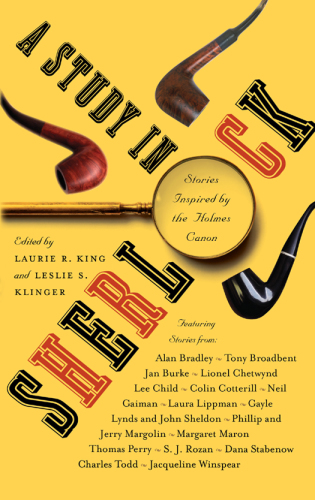
A Study in Sherlock
Stories inspired by the Holmes canon
کتاب های مرتبط
- اطلاعات
- نقد و بررسی
- دیدگاه کاربران
نقد و بررسی

Starred review from September 5, 2011
King (The Beekeeper’s Apprentice and 10 other Mary Russell novels) and Klinger (The New Annotated Sherlock Holmes) have not stuck to the usual suspects for this stellar anthology of 16 new short stories that pay homage to the great detective. Perhaps the highlight is S.J. Rozan’s “The Men with the Twisted Lips,” a particularly clever alternate take on a canonical Holmes story. Phillip and Jerry Margolin provide a fair-play whodunit centering on the purported discovery of evidence of a Holmes story written exclusively for Queen Victoria in “The Adventure of the Purloined Paget.” Colin Cotterill takes a humorous approach in his illustrated selection, “The Mysterious Case of the Unwritten Short Story,” while Charles Todd’s “The Case That Holmes Lost” convincingly recreates Doyle himself, grappling with a lawsuit aimed at his most famous creation. Other contributors include Lee Child, Neil Gaiman, Laura Lippman, Margaret Maron, and Jacqueline Winspear.

September 15, 2011
King (The Art of Detection, 2006, etc.) and Klinger (The New Annotated Sherlock Holmes, 2004, etc.) offer a selection of tributes to The Great Detective.
The 17 all-new entries range from homage to pastiche to mere whiffs of the deerstalker. In the comic-book format "The Mysterious Case of the Unwritten Short Story," Colin Cotterill revels in being asked to contribute to such an important volume despite his complete ignorance of all things Sherlock. (His greatest concern seems to be avoiding "gaffs.") Others are slicker. In "A Triumph of Logic," Gayle Lynds and John Sheldon use Holmes proxy Linwood Boothby and his law clerk Artie Morey to prove that Emmy Holcrofts's niece Ina Lederer did not really commit suicide. Lee Childs' "The Bone-Headed League" gives the Doyle classic a modern twist, while S.J. Rozan retells Doyle's tale from the opium-den-owners' perspective in "The Men With the Twisted Lips." Margaret Maron elevates Watson to the role of detective in "The Adventure of the Concert Pianist," complete with Mrs. Hudson as his Watson, while in "The Case That Holmes Lost," Charles Todd makes Conan Doyle the client, with lawyer John Whitman standing in for Holmes. Both Laura Lippman, in "The Last of Sheila-Locke Holmes," and Jacqueline Winspear, in "A Spot of Detection," trace the effect of too much Sherlock on young minds. Post-Holmes technology has its place. Dana Stabenow's "The Eyak Interpreter" runs as a blog, and King and Klinger's afterword offers a twitter exchange with King's invention, Holmes's wife Mary Russell. But the best stories focus on the universal appeal of Holmes. Tony Broadbent in "As to 'An Exact Knowledge of London' " and Neil Gaiman in "The Case of Death and Honey" both explore the tantalizing question of how Holmes manages to be both fictional and immortal.
Enough variety for the dabbler, together with enough reverence for the canon to appeal to the true Holmes addict.
(COPYRIGHT (2011) KIRKUS REVIEWS/NIELSEN BUSINESS MEDIA, INC. ALL RIGHTS RESERVED.)

October 15, 2011
Most Holmes pastiches exaggerate the characters: Holmes snippy, Watson dumb. So why not try for a bouquet of stories designed just to explore the master detective's influence on modern crime writers? That's the idea behind King and Klinger's collection. The quality is consistently high, with only a very few of the stories reading like the author jumped at a chance to clean out a drawer when the editor called. Margaret Maron surmises what Mrs. Hudson was doing when the old bookseller appeared. Laura Lippman burnishes her reputation as a literary figure who's chosen to write mysteries. Neil Gaiman finds a startling connection between The Creeping Man and Holmes' puzzling, late-life interest in bees. Pay attention to Jacqueline Winspear's take on the dangers of perusing the Holmes stories to find a way of life. But then Lee Child comes along with a funny spin on The Red-Headed League, reminding us that the canon isn't a collection of fairy tales. Instead, they're a mixture of imagination and reality, which, as the old bloodhound said himself, is the basis of my art.(Reprinted with permission of Booklist, copyright 2011, American Library Association.)

























دیدگاه کاربران